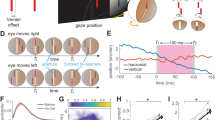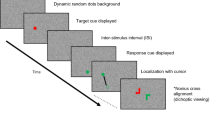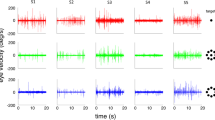Abstract
THE small movements of the eye which persist when a subject fixates (that is, tries to gaze steadily at a given target) have been studied by several workers1. We have endeavoured to deduce the movements of the image across the retina from a recent study of the rotations of the eyeball2. The movements of the retinal image have the effect of moving the boundary between two regions of differing brightness across the retinal pattern of receptors and may therefore play an important part in vision.
This is a preview of subscription content, access via your institution
Access options
Subscribe to this journal
Receive 51 print issues and online access
$199.00 per year
only $3.90 per issue
Buy this article
- Purchase on Springer Link
- Instant access to full article PDF
Prices may be subject to local taxes which are calculated during checkout
Similar content being viewed by others
References
Summarized by Lord and Wright, Reports on Progress in Physics. 13, 1 (1951).
In course of publication.
Author information
Authors and Affiliations
Rights and permissions
About this article
Cite this article
DITCHBURN, R., GINSBORG, B. Vision with a Stabilized Retinal Image. Nature 170, 36–37 (1952). https://doi.org/10.1038/170036a0
Issue Date:
DOI: https://doi.org/10.1038/170036a0
Comments
By submitting a comment you agree to abide by our Terms and Community Guidelines. If you find something abusive or that does not comply with our terms or guidelines please flag it as inappropriate.



